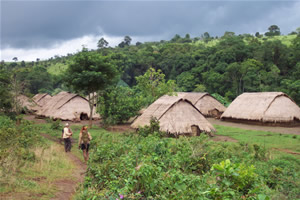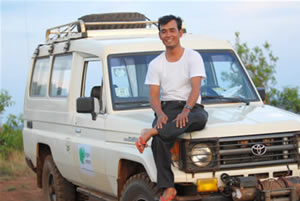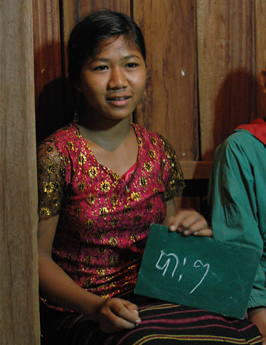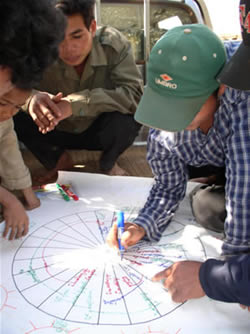ICC – PARCE Project

photo by Steve Hiett
What is ICC – READ project?
ICC – READ Project works with the Bunong people of Mondulkiri Province to implement bilingual education and food security initiatives that enable the Bunong to make informed choices about their well-being and the future development of their communities.
READ = Research Education And Development
What need is ICC – READ project meeting?
The Bunong make up approximately 80% of the 40,000 people living in Mondulkiri Province in the northeast of Cambodia. Although the Bunong way of life has remained largely unchanged for many centuries, improved infrastructure and changes to the overall Cambodian economy are bringing modernity to this formerly remote province, leaving the Bunong with the challenge of how to respond.

photo by Ari Vitikainen
In 2003, ICC – READ Project identified two key issues affecting the future of the Bunong people. According to an ICC survey undertaken at this time, only 4% of Bunong men and 1% of Bunong women could read and write competently in Khmer, with only 50% of men and 25% of women being able to speak Khmer adequately. This situation severely limits the extent to which Bunong are able to participate in national education and the future development of Cambodia.
In addition, the traditional 'slash and burn' farming and forest gathering techniques which Bunong rely on for their livelihood, have come under increased pressure as the demand for land and forest resources intensifies. As a result, the Bunong have few alternatives but to begin using permanent plots of land, improve their animal husbandry, and diversify their crops in order to provide adequate nutrition for their families.
In what ways does ICC – READ project work?
In 2001, ICC began working with several Bunong communities to produce a Bunong language orthography, which was later approved by the Government of Cambodia. Since this time, ICC – READ Project has conducted a number of additional surveys - all part of our commitment to basing our plans and activities on the foundation of good research and the use of culturally appropriate methods and language.
With 80% of the ICC – READ Project staff themselves members of the Bunong community, our project has a unique connection with and insight into the Bunong culture. This also enables all of our village-based activities and training to be conducted in the Bunong language, making them accessible by all.

photo by Ari Vitikainen
Education
International research demonstrates that a strong foundation in speaking, reading, and writing in one’s mother tongue significantly helps second language learning. With this in mind, ICC – READ Project has endeavoured to use bilingual education as a means for the Bunong to learn both their own language, and the national language, Khmer, therefore enabling them to participate in the national education system and in decision-making at a local and provincial level.
As part of this goal, ICC – READ Project has provided training and support to 65 adult education teachers to run bilingual education classes for adults in all five districts of Mondulkiri province. These classes, run by Bunong men and women, also provide an opportunity for community-based education in numeracy, health and hygiene, agriculture, and other development issues. The local department of education is also running pilot programmes in bilingual education, which ICC is pleased to support. Together we hope that the 'Education For All' goals, which are part of the Millennium Development Goals, can be achieved in Mondulkiri by 2015.
ICC – READ Project has also established a translation service to aid the production of Bunong language materials and media. As well as translating materials, we have also been involved in recording Bunong stories and producing printed folk tales that help preserve the rich Bunong history, which might otherwise be lost.
Development
In the efforts to reduce dependence on forests and ensure that steep hillsides remain productive for future generations of farming, ICC – READ Project has been running a number of trials of alternative agricultural practices to try to improve food security for the Bunong. In addition, we are promoting small 'cash cropping' initiatives that will enable families to access the local market economy without exhausting forest resources.
In cooperation with the Department of Agriculture, ICC – READ Project has trained a number of Village Livestock Agents to address the animal health problems that cause huge livestock losses in Mondulkiri.

photo by Phil Smith
These volunteers play an important role in village vaccination campaigns, de-worming programmes, and provide information to help prevent potential epidemics such as bird flu.
What are the hopes of ICC – READ project?
ICC – READ project hopes to see Bunong communities across Mondulkiri confident to take responsibility for their own development, from the foundation of being literate in both their own language and the national Khmer language. We also hope to see Bunong themselves taking an active role in supporting bilingual education, and changing the way in which they view education as a whole.
We also long for Bunong to adapt to the rapid changes in land use within their province, developing environmentally sustainable farming practices that will improve their livelihoods and secure their food sources for both today and tomorrow.
In all of our development work, ICC – READ Project seeks to model Christ-like values in the way we care for both people and the environment.
